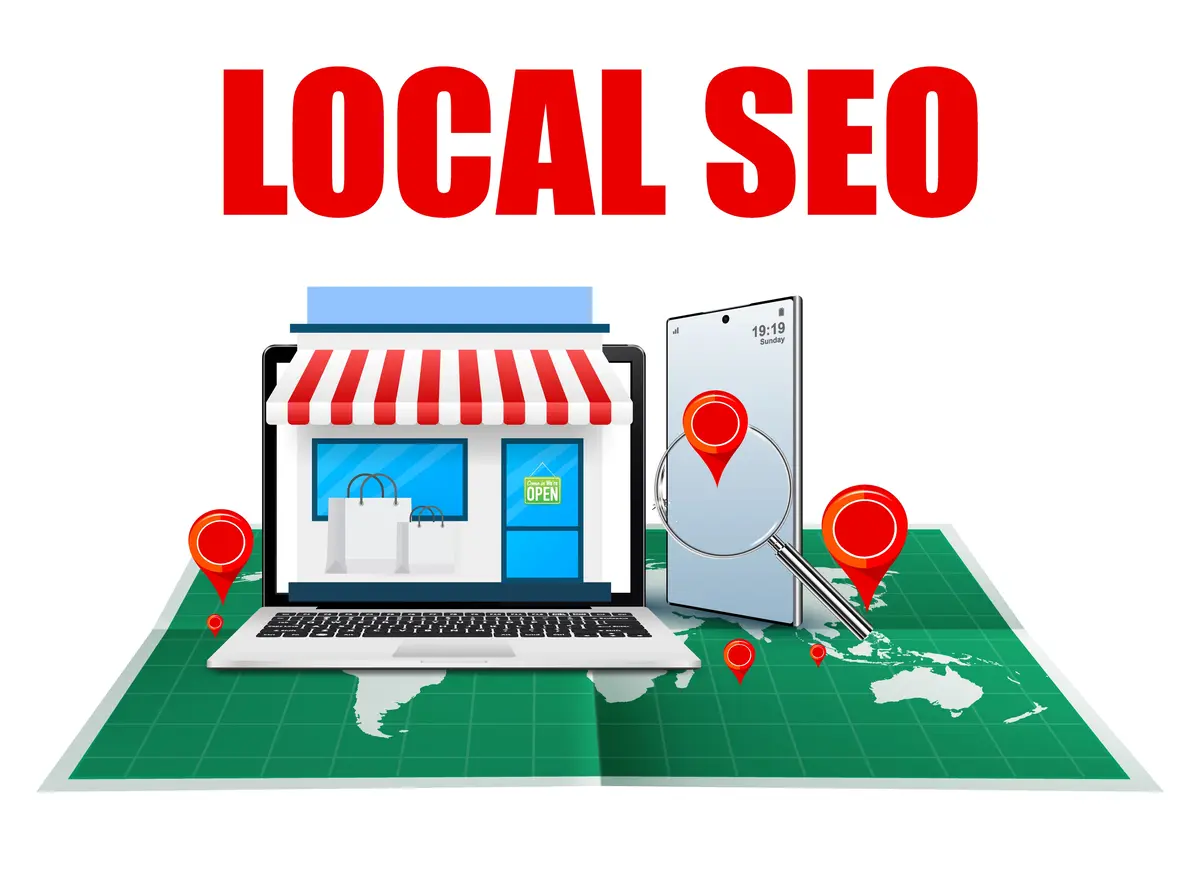Local SEO vs. Traditional SEO: Key Differences
While both Local SEO and Traditional SEO aim to increase a business’s visibility in search engines, their goals, strategies, and target audiences differ significantly. Local SEO focuses on reaching users within a specific geographic area, making it ideal for brick-and-mortar businesses, service providers, or companies with a strong local presence. Traditional SEO, on the other hand, aims to reach a broader, often national or international, audience. This guide will help you understand the fundamental differences, advantages, and applications of each, providing clarity on which strategy aligns best with your business goals.

Audience Targeting: Local vs. Global Reach
The primary difference between Local SEO and Traditional SEO lies in audience targeting. Local SEO specifically targets users within a defined geographical location, such as a city or region.
Local SEO: Tailored for businesses that operate within a limited area, like restaurants, law firms, or retail stores. The focus is on connecting with local customers who may visit a physical location.
To see how targeting works for a local business, explore our audience targeting guide .
- Traditional SEO: Ideal for businesses that offer products or services online or cater to a broad, non-geographic-specific audience. This is often used by eCommerce sites, blogs, and national service providers.
- Key Takeaway: If your business serves a local area, Local SEO should be a priority. If you operate nationally or globally, Traditional SEO will be more effective.

Keywords and Search Intent: Geographic vs. General Keywords
In Local SEO, keywords typically include geographic modifiers to capture users in a specific area. Traditional SEO keywords, however, are broader and cater to a wider audience.
- Local SEO Keywords: Terms like “plumber in Austin” or “best coffee shop near me” are common in Local SEO, reflecting users’ intent to find nearby services.
For more details on selecting the right keywords, refer to our keyword research guide .
Traditional SEO Keywords: Broader terms like “plumbing services” or “coffee shop” are often used in Traditional SEO. The aim is to attract users interested in the topic, regardless of location.
User Intent: Local SEO focuses on intent to visit a physical location, while Traditional SEO targets intent to learn or make a purchase online.
Importance of Google Business Profile in Local SEO
A Google Business Profile (GBP) is essential for Local SEO because it allows businesses to appear in Google’s Local Pack, Maps, and localized search results. Traditional SEO does not prioritize GBP, as it does not significantly impact non-local search results.
- Local SEO: A well-optimized GBP can improve visibility in local search and provide users with valuable information such as your address, phone number, and reviews.
- Example link: “See how to set up an effective GBP in our Google Business Profile guide .
- Traditional SEO: Does not typically rely on GBP, as businesses focused on broader markets benefit more from organic rankings across a wider range of keywords.
Link-Building Strategies: Local Citations vs. General Backlinks
Link-building strategies vary between Local SEO and Traditional SEO, focusing on building relevance either locally or more broadly.
Local SEO Link-Building: In Local SEO, citations from local directories and mentions from nearby businesses enhance local relevance.
Learn more about citation building in our Local citation guide .
Traditional SEO Link-Building: General backlinking strategies apply here, including links from reputable websites, guest blogging, and content marketing without a geographic focus.
Strategy: Local SEO link-building aims to reinforce geographic relevance, while Traditional SEO link-building focuses on domain authority and relevance across a wider audience.
On-Page Optimization: Local Content vs. General Content
On-page optimization differs between Local and Traditional SEO, with a distinct focus on locally relevant content for Local SEO.
Local SEO On-Page Optimization: Content should include local keywords, address details, and location-specific terms. Adding schema markup (e.g., LocalBusiness schema) can further support Local SEO.
For help with on-page optimization for local SEO, see our on-page SEO guide .
- Traditional SEO On-Page Optimization: Focuses on topic relevance, keyword density, and user engagement, without the need for location-specific terms.
- Examples of Local Content: Blog posts about local events, neighborhood guides, or customer success stories specific to your area.

User Reviews and Reputation Management
Reviews are vital for Local SEO, as they help establish trust and enhance local ranking factors. While Traditional SEO can benefit from reviews, they are more essential to Local SEO.
Local SEO: Positive reviews on platforms like Google Business Profile, Yelp, or industry-specific directories can greatly influence rankings and conversions.
Find out how to leverage customer reviews in our reputation management guide .
Traditional SEO: Online reviews are beneficial, but less impactful on rankings, as the focus is more on site authority and content relevance.
Importance: Regularly gathering and responding to reviews can significantly impact Local SEO performance.
Content Strategy: Localized Topics vs. General Topics
Content strategies differ significantly between Local and Traditional SEO, as Local SEO requires a strong focus on localized content.
Local SEO Content: Localized blog posts, events, and news stories are great ways to connect with a local audience.
“For localized content ideas, see our content marketing guide .
Traditional SEO Content: Broad topics that appeal to a global or national audience, often with the aim of ranking for general keywords.
Content Goals: Local SEO content aims to attract visitors from specific areas, while Traditional SEO content serves broader search intents.

Schema Markup for Local SEO and Traditional SEO
Structured data (schema markup) is useful in both types of SEO but serves different purposes. For Local SEO, LocalBusiness schema is essential, whereas Traditional SEO benefits more from Product, Article, or Organization schema.
Local SEO Schema: LocalBusiness schema provides Google with details about your business location, hours, and services.
Implement schema markup for local SEO with our schema guide .
Traditional SEO Schema: Structured data like FAQ schema, Article schema, or Product schema is used to improve organic search visibility.
Tracking and Analytics: Local Metrics vs. Broader Metrics
Analytics tools are useful for tracking SEO performance, but the metrics you prioritize may differ based on your focus.
Local SEO Metrics: Track metrics like GBP views, direction requests, calls, and local search rankings.
Learn about tracking local SEO performance in our analytics guide .
Traditional SEO Metrics: Focus on site-wide metrics such as bounce rate, time on page, and general keyword rankings.
Optimization: Use insights from metrics to adjust your strategy, whether focusing on local or broader performance.
Costs and Return on Investment
Finally, the costs and ROI of Local SEO and Traditional SEO vary based on the complexity of the strategy and the targeted reach.
Local SEO: Often more cost-effective for smaller businesses since it focuses on local keywords and profiles.
Traditional SEO: May require a larger budget to compete nationally or internationally, as it involves extensive keyword research, content, and link-building efforts.
- ROI Comparison: For small businesses with a local target audience, Local SEO typically yields a higher return due to reduced competition and more targeted efforts.
Understanding the distinctions between Local SEO and Traditional SEO is essential for developing an effective online presence that aligns with your business goals. By choosing the right strategy, you can maximize your visibility and connect with the right audience, whether locally or globally. Leveraging the best practices of each approach will allow you to gain a competitive edge in your specific market.
Contact Us
Drop Us a Line
Talk to Our SEO Experts – Start Your Success Journey!
